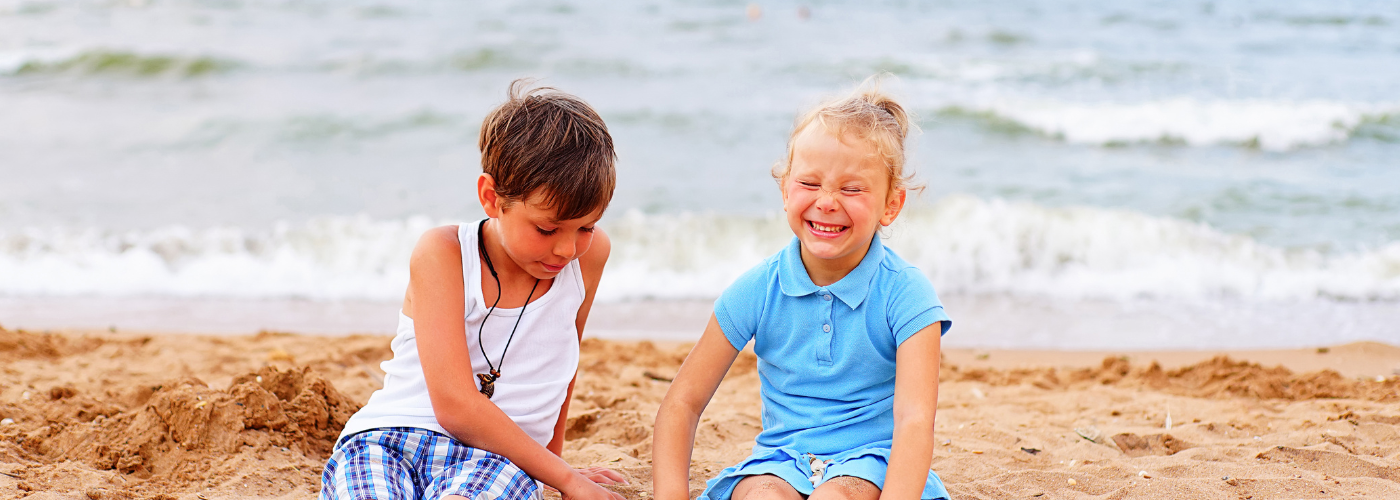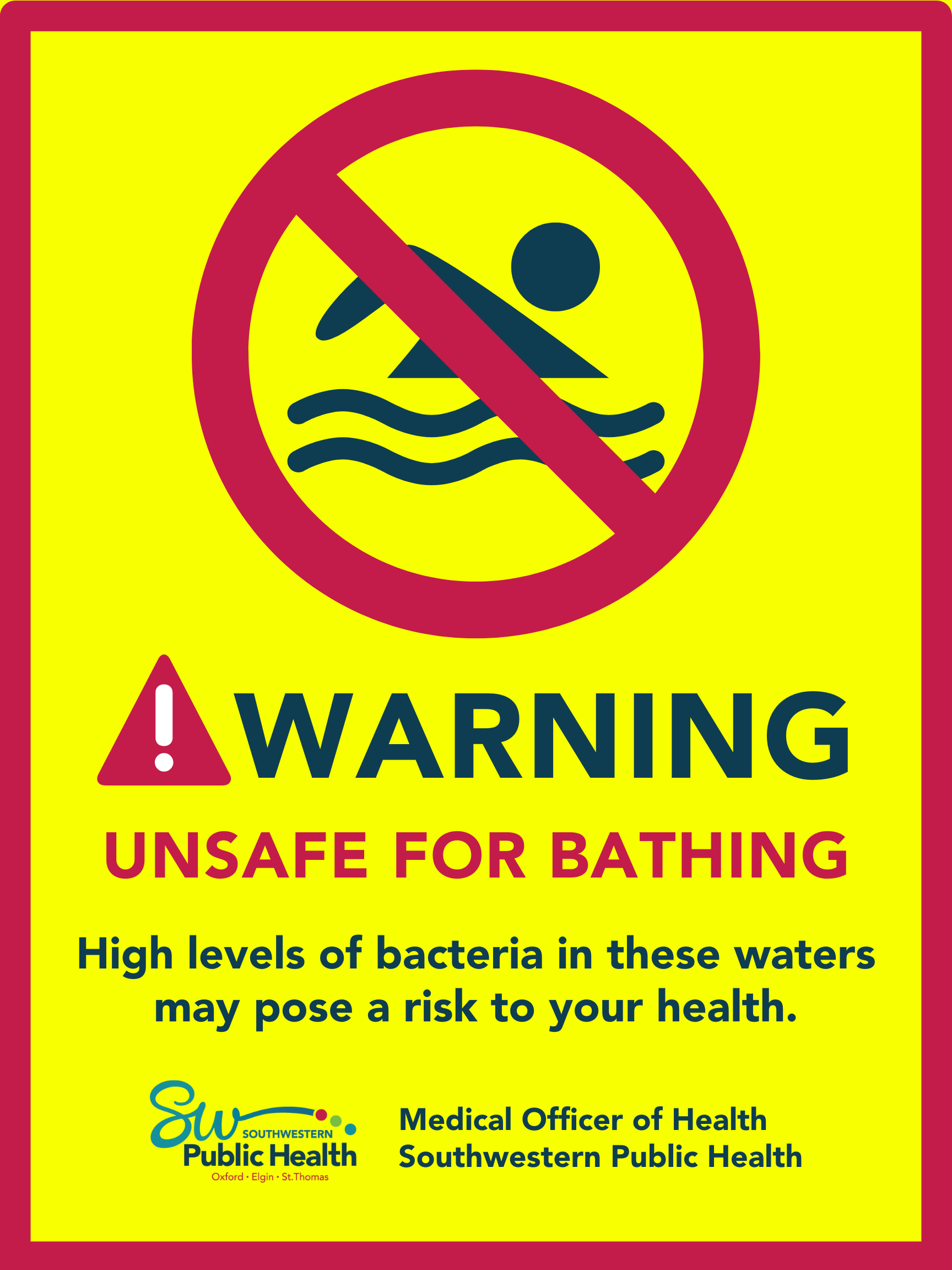Beaches

About Beach Water Testing
Beach water testing resumes on June 10 2024, with results expected on or around June 13. Results reports will then be updated weekly until Labour Day weekend.
During the summer months, between mid-June and Labour Day weekend, our Environmental Health team conducts
 weekly beach water sampling. Water samples are collected once a week, typically on Mondays; or the Tuesday following a holiday Monday. Samples are sent to a lab and results are received 24-48hrs later.
weekly beach water sampling. Water samples are collected once a week, typically on Mondays; or the Tuesday following a holiday Monday. Samples are sent to a lab and results are received 24-48hrs later.
If water results show a public beach has high levels of bacteria, a warning sign is posted at the beach indicating the water may pose a risk to your health and swimming is not recommended.
| What are we testing for? |
|
Water is tested for E. coli bacteria, which is an indicator that there is fecal contamination present from animals, humans, or both. E. coli, as well as other disease-causing organisms, can cause intestinal illness or infections of the eyes, ears, nose, or throat. |
| What are the health effects of E. coli? |
|
The eyes and skin may become itchy and irritated from direct contact with E.coli through activities such as swimming. If large amounts of E.coli bacteria are swallowed, a person may experience symptoms such as headache, fever, diarrhea, abdominal pain, nausea, and vomiting. |
| What are the guidelines for E.coli at the beaches? |
|
The recreational water (beaches) quality guideline is set jointly by the Ministry of Environment, Conservation and Parks and the Ministry of Health and Long-Term Care. A swimming advisory and warning sign is posted at the beach when water sample results show:
|
| What do the beach water sample results mean? |
|
RED: A swimming advisory is in place and swimming is not recommended. High levels of E.coli bacteria were detected in the most recent water sample results. Swimming may increase your risk of developing minor skin, eye, ear, nose or throat infections or stomach illness. If you choose to swim during a swimming advisory, avoid dunking your head or swallowing the water. GREEN: The last water sample taken did not show harmful levels of bacteria. Due to the delay in receiving lab results, do not relay only on water samples when considering what to beach to visit. Weather or other factors may have changed the water quality since then. See – Protect yourself at the beach See – What else can affect the water quality at the beach CLOSED: This beach is closed. The beach is closed when there is a significant risk to health and safety ie. sewage or chemical spills. Beach closures are rare. BLANK: No current sample to report. |
| How does E. coli get into the water? |
|
E.coli is an indicator that there is fecal contamination present from either animals, humans, or both. Recent studies suggest that waterfowl droppings are the number one contributor to increased E. coli levels in beach water. One way beach-goers can help protect the water quality is to not feed ducks, geese, sea gulls and other birds at the beach. Major rainfall can cause rainwater to runoff of nearby fields, lawns, farms, and streets. As this water runs off of these surfaces into the lake, it can bring with it animal waste, fertilizer, pesticides, trash, and many other pollutants. A number of other factors can influence the amount of bacteria, including E. coli, in the water, such as animal waste runoff, boating waste, sewer overflows, waterfowl droppings, and seasonal and storm surface run-off. |
| What else affects beach water quality? |
|
Water quality is heavily impacted by environmental conditions. Bacteria grows in the warmer waters of summer time. In addition, bacteria levels in beach water are often much higher following a heavy rainfall or high winds. As a general guideline, the Health Unit recommends that people avoid swimming in the lake for 48 hours after a significant rainfall and/or high winds as this may increase the presence of disease-causing bacteria. Beaches may also be unsafe due to floating debris, oil/ chemicals, high turbidity, and blue-green algae blooms. |
| How long will a beach advisory be in place? |
|
An advisory will stay in place until the next routine water sample is taken. Water samples are collected once a week, typically on Mondays; or the Tuesday following a holiday Monday. Samples are sent to a lab and results are received 24-48hrs later. Water quality can change day-to-day and hour-by-hour. Weather conditions can adversely affect water quality. If the water is cloudy from rough water or heavy rains, it may have high levels of bacteria for up to two days. The public is advised to consider recent weather conditions when deciding on whether or not to go swimming. |
|
What about Blue-Green Algae? |
|
Blue-green algae can produce toxins which may be harmful to health through direct contact or consumption. Until further notice, residents and visitors should take the following precautions:
While the blue-green algae may not show the presence of toxins, there is always a risk that toxins could be produced. Toxins may stay in the water for up to three weeks after the algae bloom is gone. Drinking water supplies from wells in the area have not been affected by this algae bloom, as blooms are not a concern for groundwater drinking supplies. The severity of symptoms and the level of risk to health depend on how you are exposed to blue-green algae toxins.
For more information, see the Ministry of Environment, Conservation and Parks webpage on Blue-Green Algae. |
Current Beach Water Results
| Beach/Lake | Status | Date Posted |
|---|---|---|
| Port Bruce
3360 Imperial Rd. Aylmer, ON |
GREEN | August 29, 2024 |
|
Port Burwell East Beach 1 Robinson St. Port Burwell, ON |
GREEN | August 29, 2024 |
|
Port Burwell (Provincial Park) 9 Wilson Ln. Port Burwell, ON |
GREEN | August 30, 2024 |
| Port Glasgow
8536 Haven’s Lake Rd. Rodney, ON |
GREEN | August 29, 2024 |
|
Port Stanley (Main) 348 Edith Cavell Blvd. Port Stanley, ON |
GREEN | August 29, 2024 |
|
Port Stanley (Erie Rest) Edith Cavell Blvd. Port Stanley, ON |
GREEN | August 29, 2024 |
|
Port Stanley (Little Beach) 181 Main St. Port Stanley, ON |
GREEN | August 29, 2024 |
|
Springwater Conservation Area 8079 Springwater Rd. Aylmer, ON |
GREEN | August 29, 2024 |
Protect Yourself
-
Avoid swallowing lake water
-
Avoid swimming with an open cut or wound
-
Avoid swimming for 48-hours after a significant rainfall
-
Avoid swimming in murky/turbid water
-
Stay away from the water if you are experiencing digestive or intestinal problems
-
After swimming, wash your hands before handling food
-
Shower after swimming
Protect the Beach
-
Only take pets to designated beaches, and always clean up after them
-
Don’t litter or discard food on the beach or in the water
-
Change diapered children in the bathroom, not at the beach
-
Dispose of boat sewage in onshore sanitary facilities
-
Wash your hands with soap and water after using the toilet or after changing diapers
Get beach water updates 24/7 through 211
Beach water quality updates are also available through 211, Ontario’s free information and referral service. Dial 2-1-1 to check beach status reports by telephone 24 hours a day, seven days a week.
If you have health questions or concerns about water-related illness, please ask your doctor or call Southwestern Public Health at 1-800-922-0096.
Thank you to Haldimand-Norfolk Heath Unit for allowing us to adapt some of their beach water content for our website.










